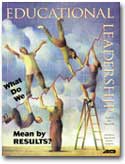Welcome to EL Extra. We have designed questions to help you and your colleagues foster meaningful discussions around the current Educational Leadership.
The study guide may be related to a particular article, a group of articles, or a theme that runs through the entire issue. Our questions will not cover all aspects of the issue, but we are hopeful that they will help you generate a conversation around key ideas. Feel free to adapt the questions to be more relevant to your school or school district—and you may even want to think of some of your own. Although you can consider many of the questions on your own, we encourage you to use them in pairs, small groups, or even large study groups.
Assessments That Make Sense
In “Charting the Course of Student Growth” (pp. 6–11), Dennie Palmer Wolf and Ann Marie White describe how educators need assessments that not only measure the current levels of student achievement, but also monitor student achievement over time.
Discuss how your school, district, or state currently assesses its students. Does your system monitor individual growth or groups of students over time? Is it standards-based? How do you report on student achievement? What are the strengths and weaknesses of your assessment system?
In the best of all worlds, we would monitor all students closely over time. But Wolf and White ask the important question: Are growth studies feasible? Apply this question to your own school, district, or state. Examine their suggestions for making growth studies feasible and discuss how they might work for you and your colleagues.
Are We Overemphasizing Tests?
After reading Mike Schmoker's “The Results We Want” (pp. 62–65) and Dale Wallace's “Results, Results, Results?” (pp. 66–68), think about where you stand on the debate over standardized tests. Do you agree with Schmoker, that standardized tests are a valuable tool for measuring student achievement, or do you feel, as Wallace does, that “worries about scores and rankings outweigh important humanistic practices, such as discussion, critical thinking, teamwork, and the development of responsibility” (p. 67)?
Virginia's new Standards of Learning have evoked numerous responses from those involved in creating, implementing, helping prepare for, and taking the tests. Read the variety of perspectives in the “Standards of Learning” section (pp. 69–77). What is your response to the Standards of Learning effort in Virginia? Does your state have a similar testing measure in place—and similar controversies surrounding its implementation? What do you think is the future of standardized testing?
